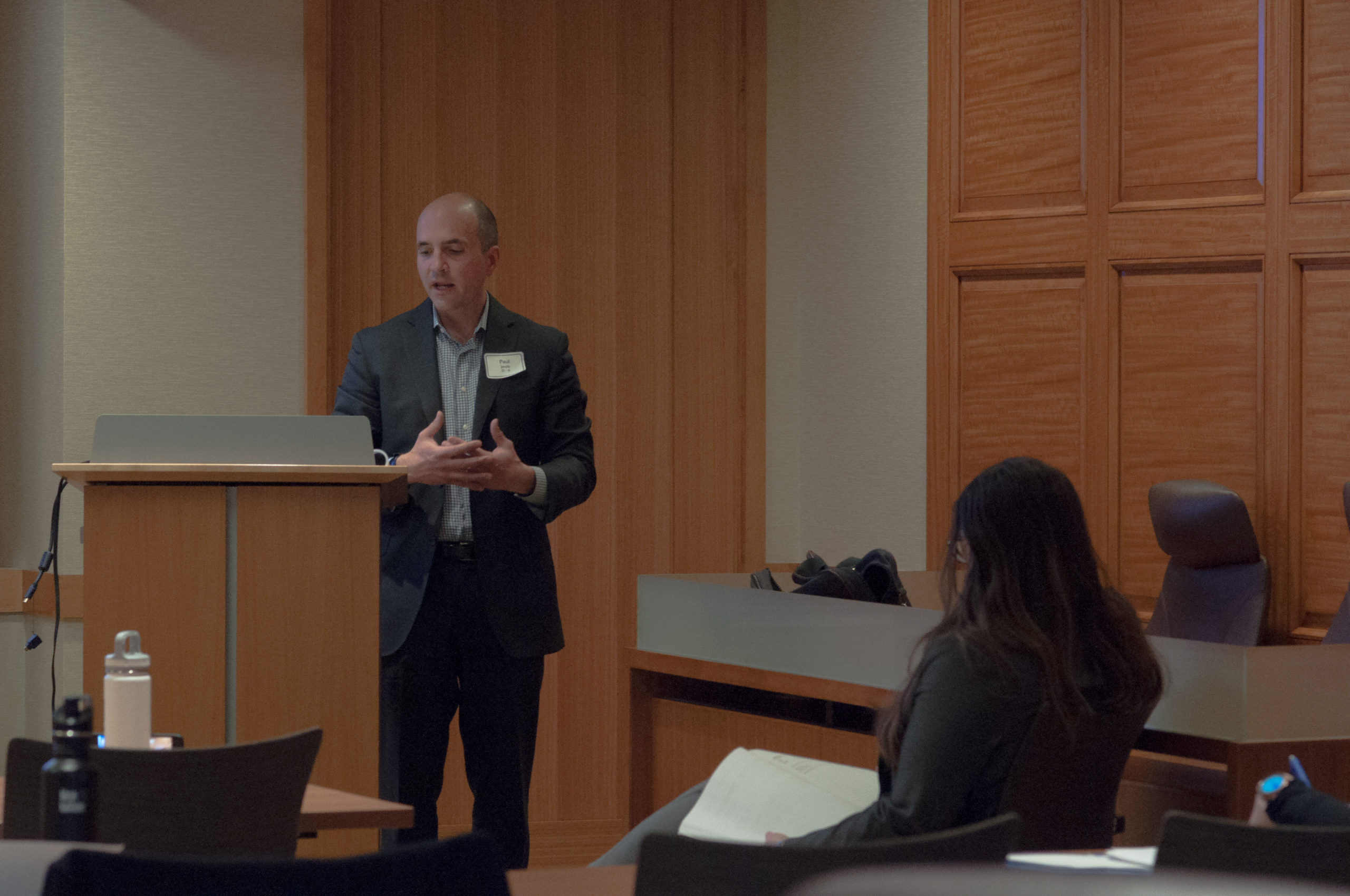
The task before the attorneys seemed simple enough. An employee of one company sent an email to a representative of another company. Now the lawyers had to get that email admitted into evidence and question the email’s sender about it.
But as Mark Caldwell, program director with the National Institute for Trial Advocacy, explained, this five-minute exchange between an attorney, witness and judge is a lot more complicated than it appears. “Until you say the magic words, you can’t use [the evidence] in trial. And if you say, ‘open wheat’ or ‘open rye,’ it’s not coming in. You’ve got to say, ‘open sesame,’” Caldwell said. “It’s got to come in by doing the right dance.”
That dance is not typically taught in law schools. Nor are many of the other skills an attorney needs in the courtroom, such as how to deliver an opening statement or cite a jury instruction during closing arguments. That’s why attorneys from around the country, most of them in their first five years of practice, were gathered at Wheeler Trigg O’Donnell’s office in Denver for NITA’s Building Trial Skills program on Monday. The four-day training program, held Dec. 13-16, featured instruction, performance workshops and live mock trial exercises designed to help lawyers learn and practice trial advocacy skills.
The story behind the program, as Caldwell tells it, goes back more than five decades to an annual meeting of the American Bar Association, where U.S. Supreme Court Chief Justice Earl Warren was giving the keynote address. “And in that address, Chief Justice Warren took the trial bar to task and basically said: You guys stink. You don’t do a fair job in representing your clients. You don’t know your way around the courtroom. You’re doing an injustice to the process of serving people’s needs,” Caldwell said.
In response, the ABA and other legal professional organizations assembled a task force to examine how lawyers learn courtroom skills, and how they might learn them better. They looked to medical and business schools and found that, unlike those disciplines, law schools didn’t provide much in the way of experiential learning. The task force concluded the lack of hands-on learning was a problem, and NITA was established in 1971 to address it.
A year later, NITA held its first trial skills program. It was a four-week training held in Boulder, the city that would serve as the organization’s headquarters for much of its existence. The trial skills program has gotten shorter since then, and an eight-day version has been held annually in Colorado for most of the past 40 years, drawing participants from around the country. The pandemic put a stop to most of NITA’s activities in 2020, according to Caldwell, but the in-person program returned this year in a compressed, four-day format.
Also new this year was the venue. Due to the pandemic, Caldwell said, NITA gave up its teaching space in Boulder. Wheeler Trigg O’Donnell volunteered its office space for this year’s Colorado program. “They have a long history of working with the organization,” Caldwell said of the firm. “We have many of their lawyers who are teachers at the program, which signifies they are some of the very best and brightest trial lawyers in the region.”

Despite the changes over the years, the philosophy and methodology at the heart of the training have stayed the same. Each program centers around a mock case; this week’s program involved a corporate dispute over a product order and whether it should have been insured. Participants were divided into two teams, one representing the plaintiff and the other representing the defendant. In a series of workshops, they practiced all the steps of a trial — from opening statements to closing arguments — in front of faculty, who then critiqued their performance.
After that, participants left the room to review video of their performance with another faculty member, who provided more detailed advice on how to improve. The participants then returned to the larger group and had the chance to perform again. “The idea is to give them repetition so that once they hear something that they’ve done wrong, they have a chance to fix it and see how it feels,” Caldwell said. The fourth and final day of the program was devoted to mock trials, allowing participants to put all their new skills together, followed by critiques.
“What we’re trying to do after their performance is give them one thing to think about. Otherwise, they get overwhelmed,” said Wheeler Trigg O’Donnell partner and NITA faculty member David Schaller, who was critiquing participants during Monday’s witness examination exercise.
“I’m listening to their examination to make sure they’re using appropriate questioning techniques, that they’re maintaining control of the witness, that they’re using eye contact,” he said. “Basically, we are trying to each give them one major point of feedback to help them improve their advocacy level.” Some participants were told to ask more open-ended questions or to add more drama to their questioning. Others received feedback on body language.
Schaller’s first experience with NITA was as a participant in a similar training program about 13 years ago. He recalled going to trial for the first time just a few months after joining Wheeler Trigg O’Donnell. “I had no idea what I was doing,” he said, so he attended the NITA program, where he spent a week working on one skill at a time.
“I took everything they told me to heart and kept it in my little notebook — I still have it,” Schaller said. “I was lucky enough to, a year later, be in trial where I actually got to use it. And it really reinforced [that] this is really what judges want to see. This is actually how it works.” The experience made him a believer in NITA, and he has taught with the organization for the past decade.
As a program faculty member, Schaller works with participants on all trial skills, but his favorite is cross-examination. “If you’re properly trained in cross and you know your case — or, in this case, you know your fact pattern — there is no better feeling than forcing a witness to give you the answers that they don’t want to give you, but they know that they have to,” he said. “And that’s a skill they teach really well here. That makes it a lot of fun.”

For Sherman & Howard associate Chelsea Reinhard, the highlight of this year’s trial skills program was the closing arguments training. “You’re getting to put the facts together and indicate what they mean — draw conclusions from the facts,” she said. “They really encouraged us to get out of our comfort zone, get up, move around the room, touch the opposing client’s table, be emphatic,” Reinhard said, adding the exercise allowed her to go beyond reciting facts at the podium to tell the story she wanted to tell.
Reinhard also attended NITA’s deposition skills training, held the week before the trial skills program, and found it “really useful.” She took some trial advocacy classes in law school that were taught in part by NITA instructors, so she was already somewhat familiar with NITA’s trial skills training. But depositions were completely new, she said, “and it’s a different type of questioning. I think just being able to have that kind of practice was really valuable.”
According to Reinhard, who is in her second year at Sherman & Howard, the firm “really places a premium” on NITA’s training program. “It’s something that most of our litigation associates go through,” she said, adding that the firm gives them billable credit for the training.
“I’m reaching that point where I’m starting to have more responsibility in my role and just really felt like it would be something helpful to get me through the first couple of trials [and] depositions,” Reinhard said.
“I think it would be really difficult if you didn’t have a place to go and give things a try in a non-threatening environment,” she said. “You can probably do that in a firm with your partner, but it’s different when you’re in a program.”
In addition to the Colorado program, NITA also held trial skills training programs in Illinois, Texas, California and New York this year, Caldwell said, and they plan to expand their in-person offerings in 2022. By implementing strict COVID protocols and vaccine requirements, Colorado participants were able to do the program without masks, he said, which helped recreate “the old days of NITA” and allowed faculty to better assess things like facial expressions and speech quality.
According to program veterans, it’s easy to spot a trial lawyer who has gone through NITA’s training. “You will hear from judges, ‘I know that lawyer has been to NITA because they know how to try a case,’” Caldwell said.
“You see it when you have a case or a trial against someone that’s NITA-trained,” Schaller added. “There’s not a lot of wasted time. It’s easier to litigate and try a case against a good lawyer than a bad lawyer. So it just improves the level of advocacy, and that’s good for everybody.”

